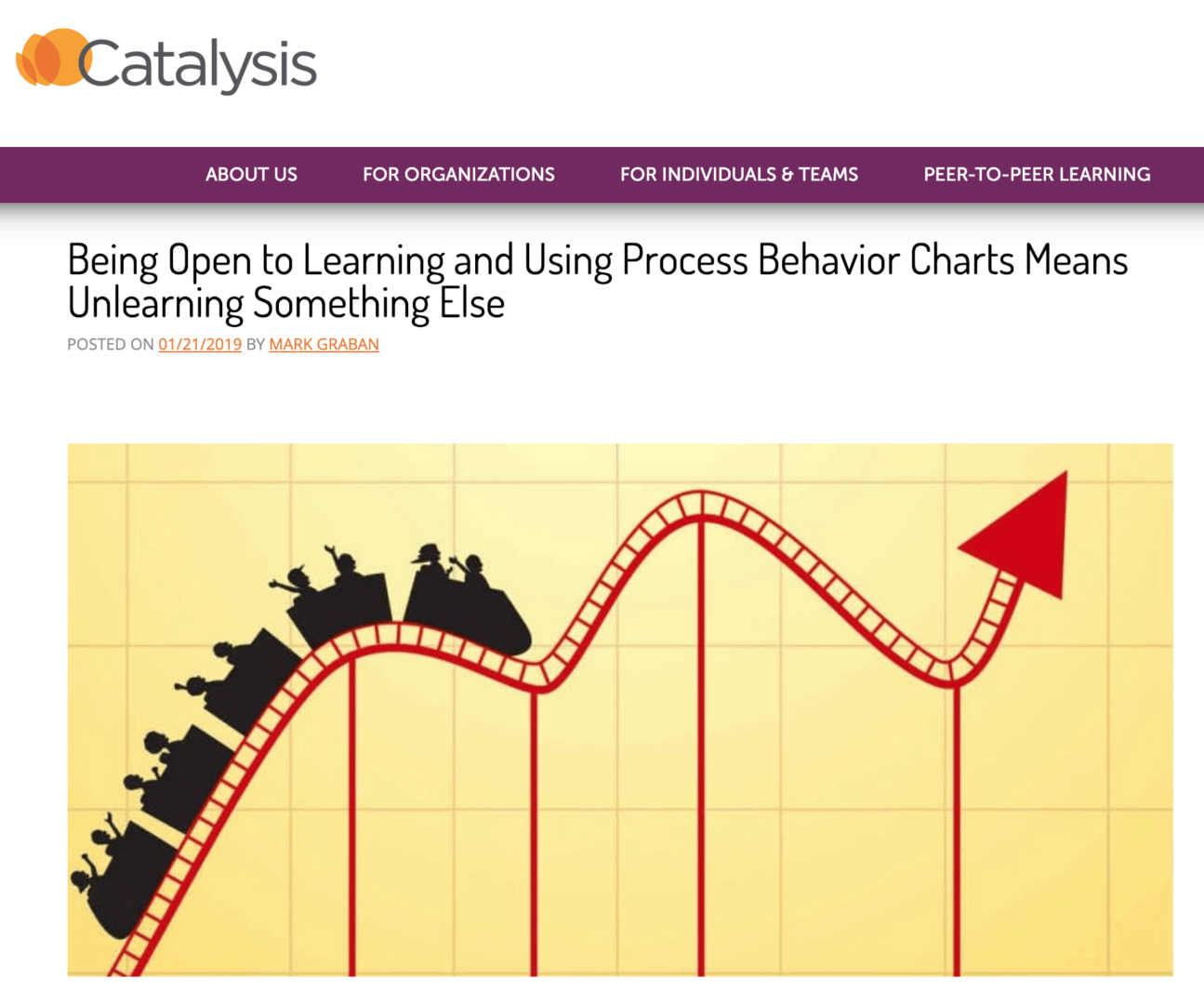Thanks to Catalysis for asking me to write a guest blog post… yesterday, they published this:
Being Open to Learning and Using Process Behavior Charts Means Unlearning Something Else
My post starts:
“Why don't people adopt best practices? I get asked this question a lot. What are some of the possible answers? Sometimes, it's as simple as people not being aware of the better way. You can't blame people for not adopting something they haven't been taught.
Other times, people just get really anchored in the way they were taught to do something. That's sometimes a variation of “the way we've always done it” or they might have been taught a new practice last year.”
Read the rest of the post here.

On the topic of “unlearning,” one of my upcoming podcasts is an interview and discussion with Barry O'Reilly, author of the book Unlearn: Let Go of Past Success to Achieve Extraordinary Results. Subscribe now to make sure you don't miss the episode.
Barry writes about the need to unlearn past knowledge, behavior, or habits before we can really learn something new. There are many situations when things that made you successful in the past are no longer valid.
I think of a hospital CNO I knew and coached about ten years ago. He had risen through the ranks of leadership (starting as a front-line nurse) by being the take-charge fix-it guy who had all the answers.
As the organization was embracing and starting to practice the Lean approach, he was trying really hard to lead in a different way. But, he lamented that people looked at him like he had two heads… because the new Dave (or what he was trying to become) was so very different than the Dave they had known for decades.
Dr. John Toussaint writes and talks about this a lot — the need to unlearn what he calls “white-coat leadership.” That's a personal journey he went through as a doctor and a CEO, as he talks about in this video clip:
In many ways, I was fortunate to learn about TPS / Lean and Dr. Deming's teachings early in my career. I had less to unlearn. That makes it a challenge sometimes to relate to people who ARE struggling to unlearn sometime.
For example, one-piece flow (or small batches) makes a lot of sense in many circumstances, but it can be a challenge to unlearn the mindset of “bigger batches are more efficient and less expensive.” Somebody might not be the least bit motivated to unlearn something… so how can they learn something new?
How many people have been sent to sit in a training class, which ended up being a waste of time since they weren't ready to learn, meaning they weren't ready unlearn what they already know?
In the book Practicing Lean, I write about my need to unlearn some behaviors that were taught to me (in school) or reinforced (in the workplace). As an engineer, you're often taught to find the right answer. The real world is far more complicated.
Instead of finding the right answer and pushing it on others, I had to unlearn some of those behaviors so I could learn and practice getting better at engaging others in developing solutions together.
I think the challenge of unlearning is a place where “Motivational Interviewing” mindsets and methods can help once we've decided we need to unlearn something. We might get “stuck” in a state of “ambivalence” where we need to change — we have some level of commitment — but we also have reasons NOT to change.
On that note, I've been reading an interesting book about how to “self apply” Motivational Interviewing to your own change challenges, something I'll write more about in the future. This book talks about personal change challenges, but I think this also applies very much in the workplace.
What have you tried to unlearn? What was the wake-up call or the moment that prompted you to work toward unlearning something? Was it a struggle? What did you do to make that work?
Please scroll down (or click) to post a comment. Connect with me on LinkedIn.
Let’s build a culture of continuous improvement and psychological safety—together. If you're a leader aiming for lasting change (not just more projects), I help organizations:
- Engage people at all levels in sustainable improvement
- Shift from fear of mistakes to learning from them
- Apply Lean thinking in practical, people-centered ways
Interested in coaching or a keynote talk? Let’s talk.
Join me for a Lean Healthcare Accelerator Trip to Japan! Learn More










In your example, “…one-piece flow (or small batches) make a lot of sense, but it can be a challenge to unlearn the mindset of ‘bigger batches are more efficient and less expensive.'” As I have shown in my recent work, it is not merely unlearning about bigger batches. Bigger batches have great practical utility for the leaders of businesses that operate in market-based economies where prices are determined by supply and demand. So learning the logic of one-piece flow is just one small part of the numerous and diverse new things that leaders must learn – or unlearn about “bigger batches.” So, a seemingly simple thing like one-piece flow easily overwhelms most leaders, which makes what they know nearly impossible to unlearn.
Here’s a relevant quote via Twitter:
The discussion via LinkedIn:
Mark,
I believe that this can be a much larger issue when an employee travels from company to company as most millenials are doing in the modern era. It is becoming a trend to stay at said company for 5 years and move to another company to offer them what you have learned elsewhere. This is where things can get sticky, because not everybody has the same processes, we know that. One must be flexible in the way they work when transitioning companies and even roles. I feel as if this can relate to the article above because it can be hard for the employee to forget what he learned previously and adopt the new companies way of work. This could be good or bad because one might unlearn what he was supposed to pass on or vice versa. This could be an issue to watch moving forward in the millenial workforce, especially in continuous improvement.
Thank you.
Comments are closed.